Innovative Activities and Resources
Men's Behaviour Change Programs
These programs are structured and planned to achieve many outcomes that promote family safety through the delivery of a well-planned set of activities and conversations by facilitators in a group setting. These outcomes may include; responsibility-taking; empathising; safety planning; respectful relationships; attitude and behaviour change; reduced abuse and violence to name just a few.
Within a program's structures, activities and conversations can be innovated to improve the alignment to the program outcomes. Ryan has innovated many activities for men's behaviour change groups and individual work that were designed during and following the completion of Ryan's Master's degree in Narrative Therapy and Community Work in 2014. Ryan's thesis informed the innovation of the Troublemaker Cards and has been published in the International Journal of Narrative Therapy and Community Work at Dulwich Centre Publications.
For example, the Troublemaker Cards, the Troublemaker and Healing Wheels and the Hierarchy of Gendered Insults will assist in unpacking and questioning dominant male cultural discourses that support men's violence towards women. The Eric-go-round, the Equality Cards, the NO Test and the Controlling Boss activity all support the active engagement of the man to acknowledge abuses and design a safety plan with an improved shift in attitude.
Ryan has used these activities in practice effectively and has been sharing them with others to support good practice to prevent men's violence towards women. See below for more information and samples of these innovations.


Engaging men individually
Other than using the Ethical Inquiry approach that is a must when engaging men individually, some of the resources and activities above can be applied to engaging a man who uses family violence during one-on-one sessions or interviews. These include;
The Eric-go-round
The Equality Cards
The Troublemaker Cards
The NO Test
The Helpful Ideas Wheel
Outsider Witness
The Helpful Ideas Wheel
Outsider Witness and Internalised Other
Controlling Boss Activity
The Controlling Boss whiteboarding activity has the dual effect of acknowledging oppressive power structures these men face in the workforce and utilising their own experience of the controlling tactics or supportive ways used by a boss or manager. Through this discussion, the men are invited to reflect on their behaviours towards family members, which promotes empathy, insight and motivates them to be supportive and respectful towards their partner in the same activity.
Below is a sample of what is written on the whiteboard following this exercise where the men get to reflect on their own words and make their own choices about what sort of partner they want to be; Controlling or Understanding.
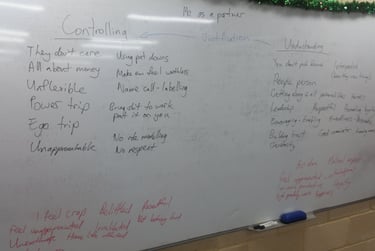

This is an essential activity in supporting the men's empathy towards their partner, to take greater responsibility for their actions and for motivating them to get on their ethical journey.
The Troublemaker Cards allow a man to develop the language and concepts that can expose and deconstruct the discourses he has subscribed to that support dominant male cultural interests. He can ask himself, ‘How did I become abusive?’ or 'What has restrained me from being respectful?' We can disturb the Troublemakers’ influence on men’s ways of being in different cultural contexts and better invite men to move towards preferences in relationships that are non-abusive and more respectful.
The Troublemaker Cards
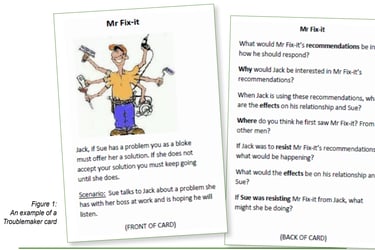

© 2024 Parallel Journeys Consulting
View Ryan's video on the Troublemaker Cards (17 min 12 sec)
A Friday Afternoon Production by Dulwich Centre Foundation
The Equality Cards
The Equality Cards support strengths-based questions used with a man who uses family violence to develop a respectful relationship and an ethical position on family violence. The circumstances to use strength-based questioning include;
The man is using denial or when he is declining to participate in the accountability process
The man is showing significant signs of defensiveness or protest in his behaviour
The man identifies with a marginalised group or has experienced significant trauma and injustice in his life
The worker decides it will be an effective way to start the accountability process
The Equality Cards are a way to have strengths-based conversations which are particularly useful when working with men who are marginalised, identify with a minority group or have experienced significant injustice or trauma in their life. The cards have been produced with the permision of 'Domestic Abuse Intervention Programs' as they are based on the Duluth Equality Wheel pictured below right. The cards scaffold concepts that assist the man in describing the actions and intentions he is striving for that support his family's safety. The cards are a physical way to engage the man and offer a point of focus during an accountable interview, group session or therapuetic session. Furthermore, men who have low levels of literacy can engage with them through pictures and scaffolding conversations offered by the worker.
Below is an example of one of the eight cards.
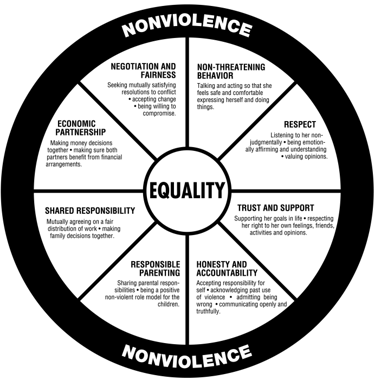





The cards come with a practice guide for use with;
men who use family violence towards female partners
women who experience family violence from a man
When using the cards to support women who have or are experiencing family violence, it assists in them in recognising the ways they prefer to be treated by a male partner.
The Eric-go-round
For practitioners, the Eric-go-round offers a constructive and non-confrontational method to engage men who use abuse, fostering a respectful atmosphere that promotes family safety. When the practitioner is holding the men accountable to established safety principles in the weeks and months of men's behaviour change, using this method they continue to use the same concepts and language in the following weeks, guiding them along their ethical journey.
The Eric-go-round is a must-have safety planning tool that can achieve many things for the man, such as;
Have greater insight into his own behaviour in a safe and respectful space
Explore the effects of his abusive behaviour on his family
Explore the preferred effects of his non-abusive behaviour and actions on his partner and family
Develop better attitudes and thinking processes such as greater levels of respect, empathy and responsibility-taking
Develop actionable personal safety plans that can be honed and improved over time
Improvements in taking safe immediate actions during high-stress situations
Developing long-term safety for the family
The Eric-go-round employs relatable metaphors such as cars, roads/intersections, and journeys, which symbolically represent the self, choices, and long-term safety planning and outcomes, respectively. This model encourages men to adopt new language while describing their abusive or non-abusive actions, transforming phrases like 'I snapped' or 'I had a short fuse' into more responsible expressions such as 'I went up Damage Drive.' For instance, one man described how he prevented himself from an abusive act when he said, 'I got on the roundabout.' These men report that during moments of high stress, the vivid imagery of the Eric-go-round becomes a cognitive tool to forestall violence when their capacity for reasoned thought is compromised.
We assert that men's abusive actions are entirely their responsibility, recognising that family violence is fundamentally an abuse of power. Nonetheless, should a man demonstrate insight and a willingness to change, we acknowledge that men can be supported in enhancing their cognitive and reasoning abilities during high-stress moments. Known as the 'fight or flight' response or 'downshifting' in brain function, this state engages the human body's sympathetic nervous system following a perceived threat, leading to increased heart rate, dilated pupils, and adrenaline release. Consequently, the brain's capacity to recall information, make decisions, and access detailed visual imagery from the frontal cortex is significantly impaired. Therefore, in a supportive and non-judgemental context, the Eric-go-round activity is designed to provide an intervention that aims to overcome these downshifting moments. With this in mind, we hold it in tension with the idea an abusive man may retain awareness and choice due to their dominant position in the family and that the perceived threat often stems from a sense of entitlement. This is why the Eric-go-round is best used in a program that coordinates other discussions to address male entitlement through the deconstruction of hegemonic masculinity, such as the Troublemaker Cards, the Gendered Hierarchy of Insults or the Troublemaker and Healing Wheels.
The Eric-go-round activity promotes more thoughtful decision-making during these high-stress moments and is a skill that develops over time with support from a practitioner. The activity's visual nature taps into the parts of the emotional midbrain responsible for direct visual processing and spatial awareness, which remain functional following a downshifting response. Therefore, the learned visual cues from the Eric-go-round can still be activated in these moments which supports a transition back to the body's parasympathetic nervous system—known as the 'rest-and-digest' response. This state helps conserve energy and restore calm by slowing the heart rate. In this resting state, an individual can engage the frontal cortex, applying cognitive and reasoning skills to consider the consequences of future actions and devise safer behavioural strategies.
While it is often observed that abusive behaviour correlates with impaired cognition during stressful episodes, the Eric-go-round also provides choices for those whose abuse is premeditated by facilitating a shift in mindset and attitude. The Eric-go-round activity fosters a respectful and safe environment that enables moments of insight and self-confrontation, potentially leading to sustained behavioural change and enhanced family safety when facilitated by a practitioner.
For Australian Indigenous men, Preston's Path is an innovative alternative to the Eric-go-round that uses more relatable symbols and metaphors to Country such as camping, paths, rivers, trees and walking.
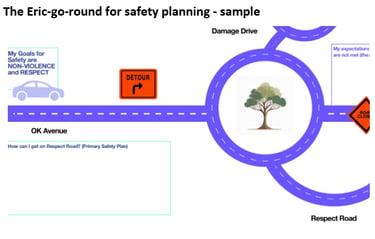

© 2024 Parallel Journeys Consulting
The Helpful Ideas Wheel
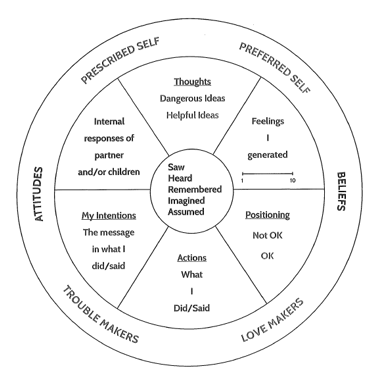

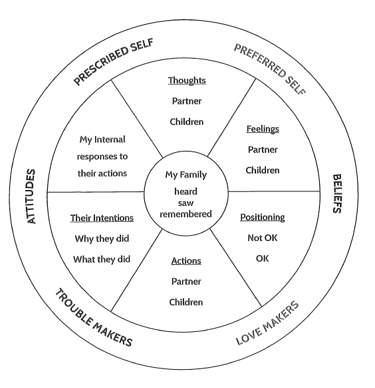

The Empathy Wheel
Descriptions are coming soon
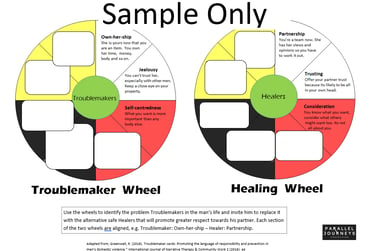

Troublemaker and Healing Wheels
This activity helps men who use violence deconstruct harmful attitudes and ideas (Troublemakers) and explore non-abusive, healing responses (Healers) to situations with their partners. The goal is to identify and replace abusive patterns with respectful and healing actions that align with their hopes for better and safer relationships.
This activity fosters self-awareness, accountability, and practical strategies for behavioural change. By regularly reflecting on and practicing Healers, the man can incrementally improve his relationships and reduce abusive behaviours over time.
Using the wheels, the facilitator chooses a Troublemaker and the alternative Healer from the same section of the wheels, e.g. Own-her-ship and Partnership.




